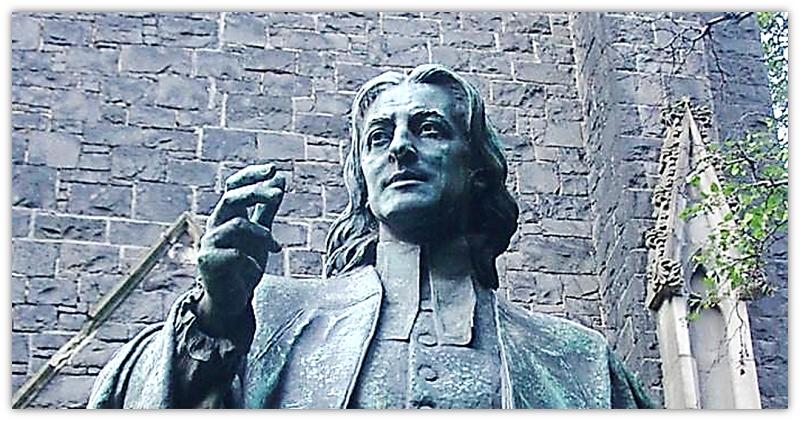John Wesley's Concept of Faith
John Wesley's Concept of Faith

It is hardly necessary to explain why John Wesley and the influence of Methodism are relevant for our exploration of determining factors in present-day spirituality. With Wesley, we are certainly in a different atmosphere from that of John Calvin. Wesley was not at all fond of Calvinism.
There is a historical development from 18th century Methodism to the 19th century Holiness Movement – with names like Andrew Murray, Charles Finney and Reuben A. Torrey – and from there to the 20th century Pentecostal and Charismatic Movement. John Wesley’s emphasis on holiness and perfection, and his powerful mass meetings, where many people were moved and not infrequently physically affected by his message, had a long-lasting influence within the Methodist movement and beyond it. He was not a theologian like Calvin, but he was a great spiritual leader in his time, and is still regarded so in ours. We can respect his zeal for the Lord and for the gospel. His untiring work was no less impressive than Calvin’s.
Nevertheless, there is reason enough to look closer at a few features of his message, and to do so critically. It is good to realize that though we have to deal with certain aspects of a man’s conviction, this does not mean that we are judging his heart or soul. Also, when we deal with present-day issues in Christianity, we need to discern between the person and the doctrine he is presenting!
It is not possible to treat Wesley’s doctrine of Justification and Sanctification exhaustively. I considered it would be useful to focus on his idea of faith. We see the difference with Calvin’s thinking more clearly then.
So I mainly want to explore his idea of faith, which he often called ‘the gate of religion’, and from there see how he dealt with justification and sanctification. We also hope to get a view into his somewhat ambiguous attitude towards ‘enthusiasm’.
Faith as the Gate of Religion⤒🔗
With a deep conviction, Wesley repeatedly stresses the necessity of faith. ‘Saving faith is a sure trust and confidence which a man has in God, that by the merits of Christ his sins are forgiven, and he is reconciled to the favour of God.’1 It is also clear that Wesley sees faith as a gift of God, although he does not emphasize that very much.2
The very essence of Wesley’s preaching, however, is not on faith, but on its effect in a believer’s life. In a letter from 1739 he writes:
a man (...) is not to think well of his own state till he experiences something within himself, which he has not yet experienced, but which he may be beforehand assured he shall, if the promises of God are true. That something is a living faith; a sure trust and confidence in God, that by the merits of Christ his sins are forgiven, and he reconciled to the favour of God. And from this will spring many other things, which till then he experienced not; as the love of God shed abroad in his heart, the peace of God which passeth all understanding, and joy in the holy Ghost; joy, though not unfelt, yet unspeakable, and full of glory.3
For Wesley, the importance of faith is as the gate to what really is important: the feeling of assurance and forgiveness. Religion can be described without using the word faith, the most essential feeling being love.

So it is rather that faith is ‘the gate to the inward religion’ than that faith itself is indicating the most important change that a Christian needs to have. Faith as well as justification by faith only have their significance ‘at first’.4 This faith is also not sufficient for acquittal at the Day of Judgment, but only for ‘the present remission of our sins.’5
For being a child of God it is not sufficient to believe. Faith only brings in ‘a state of acceptance to God’, which is the state of a servant, and not that of a child of God. The necessary stage is reached only when a man can testify as his divine conviction that he, by faith, is in a state of life in which he experiences that the Son of God has ‘loved me and given Himself for me’. Only when this testimony is given as an internal assurance can a man call himself a child of God.6
Wesley on Justification by Faith←⤒🔗
John Wesley certainly confesses that believers are accepted by God ‘wholly and solely for the sake of what Christ hath done and suffered for them.’7 However, in the course of his development he became afraid of antinomianism to such an extent that in the end he did not any more use the term ‘imputation of the righteousness of Christ’.8 He rather emphasized that our faith is imputed to us as righteousness. Of course, there is nothing wrong with that, but it is characteristic! In Wesley’s thinking the inward aspect always prevails over the relationship with God in Christ.
Moreover, for Wesley it is not justification that is decisive for salvation, but sanctification. It is the new life that is most necessary. Of course, justification is necessary for salvation, but it is not sufficient. The real, essential change in a Christian’s life has to be sanctification, or rather holiness. Wesley mostly treats justification in view of sanctification. Justification for Wesley only means a relative change, sanctification a real one.9 There is a clear difference with Calvin in this respect. For Calvin, justification and sanctification are both given by the grace of God, and they are closely connected. The one cannot exist without the other. Essential to both is the relationship with Christ by faith.
This was not acceptable to Wesley. To him, Calvinism was an impediment on the way to holiness.10
Certainly Wesley confessed that to him justification is a work of God.11 At the same time, the fact that some people believe, and others don’t, is caused not by divine election, as Calvin and Whitefield would say, but by ‘the free responsiveness of human nature’12 that was not taken away.13
Wesley had developed a special construction in order to say that the free choice of man is still caused by free grace. Wesley was convinced that this ‘preventing’ or ‘prevenient’ grace is given to every human being.14 With this construction he could replace the doctrine of predestination of Calvinism. Nevertheless, Wesley’s doctrine of conditions must not be overlooked. In order to receive the grace of faith there must be repentance and ‘works meet for repentance’ that go before faith.15
Sola fide←⤒🔗
One might say that within the framework of Wesley’s doctrine of justification the Reformation conviction of sola fide, (faith alone) is now at stake! There is yet another factor that makes clear what kind of spirituality we find here. It is not only the additional factor of works alongside faith that is needed for justification, but also the extra factor of experience alongside faith as a decisive condition. Wesley confesses justification by faith alone, but the question must be asked: What is the nature of that faith?
Someone rightly observes with regard to this question: ‘Wesley always begins with man’.16 This not only goes for the decision man must make, but it also goes for the experiences of justification. Wesley often gives descriptions of very emotional and even physical experiences that to him present an evident experience of justification, without even a mention of faith! From his Journal, quite a few instances can be given.
In May 1759 we read:
…a stranger (...) fell backward to the wall; then forward on his knees, wringing his hands, and roaring like a bull. His face first turned quite red, then almost black. He rose, and ran against the wall, till Mr. Keeling and another held him. He screamed out, ‘O what shall I do, what shall I do? O for one drop of the blood of Christ!’ As he spoke, God set his soul at liberty: he knew his sins were blotted out; and the rapture he was in seemed too great for human nature to bear.17

Apparently, in one of Wesley’s descriptions of faith – ‘an assurance that Christ loved me and gave himself for me’18 – the words loved me and for me are emphasized in such a way that we get the impression that the assurance of faith and justification rests upon the discovery of something within man. That something is none other than what is experienced inwardly.
He can ask: ‘Does anyone believe, who has not the witness in himself, or any longer than he sees, loves, obeys God?’ The answer is: ‘we apprehend not, seeing God being the very essence of faith; love and obedience the inseparable properties of it.’19 So for Wesley the essence of faith is: seeing God. This is so different from the Reformers, by whom repeatedly faith was founded upon trusting the promises of the gospel.20
It also appears in Wesley’s own conversion experience – the famous Aldersgate Street experience on May 24, 1738, when listening to Luther’s Preface to his explanation of the letter to the Romans. Wesley describes this moment as follows:
About a quarter before nine, while he was describing the change which God works in the heart through faith in Christ, I felt my heart strangely warmed. I felt I did trust in Christ, Christ alone for salvation: And an assurance was given me, that he had taken away my sins, even mine, and saved me from the law of sin and death.21
It is remarkable that the emphasis is not on faith in Christ, on trusting Him, but on the feeling of that. A shift is to be found from a Christ-centred or God-centred way of dealing with faith to a man-centred faith. It is an anthropocentric tendency. Still, we ought not to overlook the fact that Wesley’s experience that day really was significant to his confession of justification by faith.22 Nevertheless, the very accent in all his dealings with faith and with justification is strongly anthropocentric. And that accent has been influential though the centuries since his time!
Faith and Sanctification←⤒🔗
Of course, it is well known how Wesley’s concept of sanctification aims at perfection. He himself did not speak of sinless perfection, but rather used the term Christian perfection. His friend John Fletcher, though, had no hesitation in speaking of sinless perfection also. But I am not dealing with that now.23 It is perhaps enough to say that to Wesley a combination of faith and love, of faith and good works is essential for being a Methodist.
In order to understand the secret of this combination we must know how Wesley understood faith. This has been called ‘peculiar faith’. If we believe that God is promising that we may become holy, He is also able, and prepared, ‘to do it now’. So faith is strongly emphasized, but almost exclusively as it is focused on something that can happen immediately, on a special experience.24 So this ‘peculiar faith’ is directed to something, something that can happen ‘even now’. Wesley likes to use expressions as merely by faith and by simple faith. He then always means a faith that is attaining some experience.25
In a characteristic booklet, The Character of a Methodist,26 Wesley describes the ‘true’ Methodist in the following words:
There is not a motion in his heart, but is according to his will. Every thought that arises points to Him, and is in obedience to the law of Christ.
By consequence, whatsoever he doeth, it is all to the glory of God. In all his employments of every kind, he not only aims at this (which is implied in having a single eye,) but actually attains it.27

So the idea of sanctification is that it is reached. Faith is not a matter of walking in communion with the Lord, and of struggling against sin. Faith indicates that I aimed at something, and reached it. Living in sanctification does not necessarily mean any more living by faith. ‘Holiness comes by faith’28 to Wesley indicates the road to holiness, not holiness or sanctification itself.
When Wesley gives examples of his pastoral care, he never asks after someone’s faith in the Lord, but asks questions like ‘Do you pray always? Do you rejoice in God every moment (...) Do you desire nothing? (..) Do you feel the love of God continually in your heart?’29
We must see how Wesley was certainly very effective in influencing the people he spoke with, but at the same time observe that his approach is entirely anthropocentric. It is not the object of faith who is put in the centre, but the believer – with his or her life in holiness.
Wesley’s Attitude to ‘Sola Fide’←⤒🔗
In his A Plain Account of Christian Perfection, Wesley strongly opposed Christians who wanted to live by faith alone. He was afraid of a life that would abandon obedience to the law of God, as he perceived such tendencies in the Moravians, followers of Count Zinzendorf. In that connection he wrote things such as ‘Beware of solifidianism’!30 With regard to justification he certainly maintained ‘sola fide’, although the role of conditions in that respect is essential to such an extent that we see a synergistic model. With regard to sanctification, we find that he testifies at the same time to a holiness that is attainable ‘by simple faith’ and his testimonies of aversion from the sola fide. This can be explained from the fact that Wesley uses two approaches to ‘faith’.
The result of this attitude to faith is that
- faith is only important when it is combined with works, and
- faith does not have its meaning or find its aim until it reaches certain experiences.
What is absent in Wesley’s doctrine is that faith implies a relation to the promises of the gospel, to the Scriptures, and even to Christ. Because of his focus on experience, Wesley’s concept of faith has become completely anthropocentric. Faith even disappears behind the horizon of experience.31
The Testimony of the Holy Spirit Felt←⤒🔗
We must pay attention to Wesley’s dealing with the testimony of the Holy Spirit as a special and important experience. This relates to the assurance of faith. For Wesley, assurance is not through believing in Christ, whereby the anchorage of faith lies outside man, in Christ. On the contrary, assurance lies exclusively within the believer, within his experience, and for the duration of the experience. The testimony of the Holy Spirit in this connection is a direct testimony of the Holy Spirit with our spirit. He describes it as follows:
The testimony of the Holy Spirit is an inward impression on the soul, whereby the Spirit of God directly witnesses to my spirit, that I am a child of God; that Jesus hath loved me, and given himself for me, and that all my sins are blotted out, and I, even I, am reconciled to God.32
It is characteristic for Wesley that he explains the testimony of the Spirit without any reference to faith. He is aware of the danger of enthusiasm, and also that the voice of one’s own imagination can be taken for the witness of the Spirit. Nevertheless, the main point of assurance is put in terms of someone’s own experience.
It is useful to realize that, in contrast to the doctrine of the Reformation, in Wesley’s thinking a shift has taken place from the assurance of faith to the assurance of experience. Another point of difference is the fact that for the Reformers the assurance of faith has to do with future salvation, whereas for Wesley the assurance is limited to the present state of the experience.

What then is this experience for him? It is a matter of feeling, of seeing, of observing the reality of faith. The consequences of this experience are shown in the almost unbelievable declaration his Journal gives eight months after the Aldersgate Street event. He then declares that he is not a Christian because he feels that at that moment he does not love God:
I affirm I am not a Christian now. Indeed, what I might have been I know not, had I been faithful to the grace then given, when expecting nothing less, I received such a sense of the forgiveness of my sins, as till then I never knew. But that I am not a Christian at this day, I as assuredly know, as that Jesus is the Christ (…) I have not any love of God. I do not know either the Father or the Son.33
All anchorage and assurance is found in what is felt. This goes for his doctrine of justification and also for his conviction of sanctification.
Even physical experiences are part of this experiential evidence. Indeed, of his Aldersgate Street conversion in 1738 he said: ‘I felt my heart strangely warmed.’34 We also hear of ‘strong tremblings’35 that occurred during worship services.36
Experience yes, Enthusiasm no...←⤒🔗
A few times Wesley expresses some doubt with regard to the evidence of experience. That is when he must conclude that the experience is ending in enthusiasm. Then pride and haughtiness enter in. In such situations, Wesley gives the strong admonition to be lowly in heart ‘lest Satan should get advantage over him.’37
Enthusiasm is described as
‘...a sort of religious madness; a false imagination of being inspired by God’. An ‘enthusiast’ to him is ‘one that fancies himself under the influence of the Holy ghost, when, in fact, he is not.’38
When he is confronted with extraordinary reactions during his own sermons and the revivals that occurred, he knows there are tares among the wheat. He then infers haughtiness and enthusiasm.39
Nevertheless, in his Journals we find many places where he easily seems to yield to the evidence of extraordinary powers and experiences that occurred in his open-air meetings, as well in the witness of people he met. Generally, Wesley meets all kinds of bodily and emotional outbursts with gratitude, and concludes them a great fruit on his preaching, insofar as he one time calls out: ‘What a day of Jubilee was this!’40
Wesley tells that he once asked the Scottish Presbyterian preacher Ralph Erskine – well known as one of the ‘Marrow men’ – how he would judge such phenomena. Erskine then answered that Satan can also manifest himself like that in order to obstruct the good work of God. The fruits of justice and conversion will give final proof what was from God and what not.41 It seems that Wesley did not know very well how to handle this judgment.42 Even cases of demonic possession or frenzy are in the end mentioned as a way of participation of the devil in what God does.43 One might conclude that Wesley abhors enthusiasm, but that his criticism is without criterion.
At Last←⤒🔗
Perhaps we must say that Wesley, in spite of his criticism of enthusiasm, accepted the same when it occurred in the circle of his own adherents. At best, we can call this a rather naive attitude. He did not use the rule of the written Word – as he himself had advised to do – and so, in fact, his preaching sometimes even opened the door to enthusiasm. What is missing is the use of the standard of faith instead of the standard of experience.

Why is it so important to have this clear vision on our famous and beloved brother John Wesley? Of course, this is because his influence has been seen in the centuries following him. He left a stamp on his own age, the 18th century. The revival and holiness movements in the 19th century cannot be thought of apart from his influence. The daughter of the holiness movement, born on the threshold of the 20th century and still active, is the Pentecostal Movement. The church of our own time, the 21st century, has to be aware of the attractions of the Charismatic Movement, in which the fundamental choices of John Wesley and his friends are still active.
And the answer to all this? A thorough awareness of the meaning of faith, faith being the standard of life, and of experience, and of salvation; faith having its anchorage in the promises of the Holy God, in all that is outside ourselves, and in Christ, the Saviour.

Add new comment